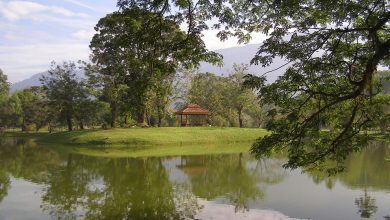The opportunity to participate in the Songkran Festival at Kampung Tasek in Pengkalan Hulu, Perak, was exciting indeed. Songkran has been celebrated by the local Siamese community in this part of Perak since 38 years ago.
Held at the Kampung Tasek community hall, Songkran, which is popularly known as a water war, is a traditional celebration of the Thai New Year that has been passed down from generation to generation. It normally falls on April 13 or 14. The date, coincidentally, is in the middle of the hottest month in Thailand.
The word “Songkran” originates from Sanskrit, which is interpreted as a departure or transition, marking the advent of a new year. Based on the Siamese lunar calendar, it falls on the fifth month and on the 15th day of the full moon.
Interestingly, Songkran was initially a festival of the Hindu Brahmins in India. It was then observed in Suwannabhumi (Thailand) in early AD before it was embraced by the Hindu-Buddhist communities in Laos and Cambodia.
According to tradition, Songkran is celebrated by the younger generation, including children, to seek forgiveness and blessings from the elders, such as parents, grandparents, monks and teachers.
As a mark of forgiveness, the elders are showered with clean, fragrant water on their hands, feet, and, subsequently, all over their body. However, the young would first have to ask for permission before doing so. During the washing, the elderly folks would pray for happiness in the younger generation, including their children and grandchildren. After that, the elders change into new and clean clothes.
Although Songkran festival is not religious, the Thais take this celebration as an opportunity to accumulate heavenly points. They would usually hold a bathing ritual for the statue of Buddha and Buddhist monks. The public would visit the temple in the morning, where the men would clean up the wat (Thai temple) as a symbol of a fresh beginning.
To further enliven the Songkran Festival at Kampung Tasek, various activities were organised, including a Songkran beauty contest, football, and the ‘klong jau’ dance performance. According to Wong Yook Lian, 53, a local of Thai descent, the tradition of drenching the elders is becoming less popular because of the cold. “Children are the ones who have the most fun during Songkran, where they get to play with water, and apply powder on others,” she said.
Seven teenage girls competed for the coveted Miss Songkran title. The winner was chosen based on beauty, costume, and catwalk. Miss Songkran would then be paraded around the village in a decorated vehicle together with the rest of the participants thus marking the end of the festival. Due to changing times, the celebration of Songkran now includes the singing of upbeat Thai songs by young performers who dance energetically to the tunes on stage. Notwithstanding that, the universal values of Songkran such as gratefulness and appreciation are to be emulated as a foundation of shaping a well-mannered Malaysian community.
Pengkalan Hulu District Council president, Mohd Syukri Azaari, hoped that the annual event could be included in the national tourism calendar just like the way it is listed in the tourism calendar of Perak.
Rosli Mansor


